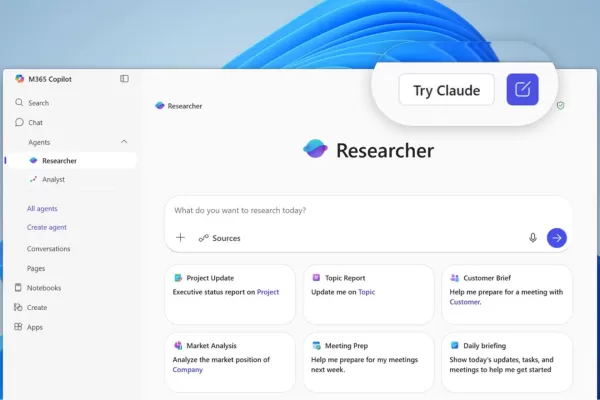AI-Driven Travel: Plan Your Perfect Getaway with Ease
Crafting a vacation can feel daunting, with endless searches and reviews turning excitement into stress. AI-powered travel planning changes that, making the process smooth and enjoyable. This article dives into how AI revolutionizes travel, spotlighting tools and strategies to create your ideal trip with unmatched ease and personalization.
Key Points
AI examines past behaviors to recommend tailored destinations and activities.
AI tools streamline trip routing and itinerary planning, saving time and easing stress.
AI delivers real-time suggestions, virtual tours, and immersive travel experiences.
Platforms like Atlas IQ use AI to make travel planning more efficient and accessible.
AI refines recommendations through feedback, enhancing travel planning platforms.
AI optimizes trips using user reviews, past experiences, and potential obstacles.
AI offers hyper-personalized travel, matching accommodations and experiences to unique preferences.
The AI Revolution in Travel Planning
What is AI-Powered Travel Planning?
AI-powered travel planning uses artificial intelligence to simplify and customize trip organization.

Rather than relying on manual research or generic suggestions, AI processes vast data to understand preferences, suggest optimal routes, and recommend tailored activities. This technology reduces common planning frustrations like information overload, offering targeted, relevant options. AI’s integration into travel planning marks a major industry advancement, delivering efficient, personalized, and enjoyable experiences.
Data-Driven Choices: AI uses past travel data, reviews, and real-time insights for informed suggestions.
Tailored Suggestions: AI customizes recommendations to individual tastes for satisfying travel plans.
Streamlined Itinerary Planning: AI optimizes routes and schedules, reducing travel stress.
The Current Landscape of AI in Travel:
AI’s integration into travel has sparked innovative tools and platforms to simplify and enrich trip planning.
- Tailored Suggestions: AI analyzes user data like past trips, preferences, and real-time info to recommend destinations, activities, and accommodations aligned with interests.
- Smart Routing: AI navigation tools optimize routes using real-time traffic, weather, and preferences, avoiding delays for efficient travel.
- Dynamic Pricing: AI tracks market trends and historical data to offer real-time pricing for flights, accommodations, and services, helping travelers find the best deals.
- Chatbots and Virtual Assistants: AI chatbots provide instant support, answering questions and offering recommendations for a seamless experience.
- Predictive Analytics: AI forecasts travel patterns and disruptions, helping providers optimize resources and improve service.
AI analyzes past trips, trends, and reviews to deliver real-time insights, from price comparisons to unique destinations. It aims for hyper-personalization, optimized routing, and real-time support, ensuring stress-free, tailored journeys.
Delving Deeper: AI Algorithms and Your Vacation Preferences
How AI Understands Your Travel Preferences
AI travel planning relies on data, not magic.

AI algorithms study your preferences, habits, and past trips to predict what you’ll love, much like a friend who knows your tastes.
How AI deciphers your travel preferences:
- Past Behavior: AI examines your travel history, noting patterns like frequent beach resort searches or interest in hiking destinations.
- Feedback Loops: Your input, like “Was this helpful?” responses, refines AI recommendations, adjusting based on likes or dislikes.
- Time Spent: AI tracks how long you view recommendations, prioritizing options you linger on, like a luxury resort, over ones you skip.
- Social Media: Your likes, follows, and tagged destinations shape AI’s understanding, recommending sustainable travel if you engage with eco-tourism posts.
- Reviews and Ratings: AI aggregates reviews to assess accommodations and activities, ensuring quality recommendations based on cleanliness, service, and value.
- Search History: Frequent searches for cultural or family-friendly destinations guide AI to tailor suggestions to your interests.
- Booking Data: AI analyzes past bookings to predict future needs, building a detailed profile of your travel preferences.
AI combines these insights to create a personalized travel profile, delivering inspiring and relevant recommendations.
Harnessing AI: A Step-by-Step Guide to AI-Powered Travel
Step 1: Choosing the Right AI Travel Platform
Select an AI-driven platform for seamless planning. Key features to consider:
- Personalization: Seek platforms offering tailored recommendations based on your preferences and past trips.
- Smart Routing: Choose tools optimizing routes with real-time data.
- Dynamic Pricing: Opt for platforms providing real-time pricing insights for the best deals.
Compare reviews and features. Platforms like awaits.io offer personalized AI-driven travel solutions.

These tools are transforming travel, making it more accessible and tailored.
Step 2: Inputting Your Travel Preferences
AI’s effectiveness depends on detailed input.

Provide thorough preferences, including:
- Past Trips: Share details of previous destinations, activities, and accommodations to inform AI recommendations.
- Interests: Note hobbies like culinary tourism or outdoor adventures for relevant suggestions.
- Budget: Specify financial limits to ensure affordable recommendations.
- Travel Style: Indicate solo, family, or romantic travel for tailored suggestions.
- Accommodations: Describe preferences, like luxury hotels or eco-friendly resorts, for suitable lodging options.
Detailed input leads to highly personalized recommendations.
Step 3: Navigating AI Recommendations and Adjustments
Review AI-generated suggestions for destinations, accommodations, and routes, considering:
- Relevance: Ensure recommendations match your preferences and goals.
- Feasibility: Check logistics, visa needs, and language barriers.
- Reviews: Use traveler feedback to assess recommendation quality.
Adjust recommendations as needed. AI learns from feedback to improve future suggestions.
Step 4: Embrace AI for Real-Time Assistance
AI offers real-time support during travel. To maximize this:
- Use Chatbots: AI chatbots provide instant answers and solutions.
- Enable Updates: Opt for real-time alerts on flight delays or local conditions.
- Explore AR Navigation: Use augmented reality tools for easier navigation in unfamiliar places.
Pricing: Investing in Your Dream Getaway
Understanding AI Travel Planning Costs
AI travel tool costs vary:
- Free Platforms: Basic AI features like recommendations and price predictions are often free.
- Subscriptions: Premium services range from $10-$50 monthly, offering enhanced customization.
- Pay-as-You-Go: Pay per trip or consultation for flexible AI insights.
- Bundled Packages: Travel agencies may include AI planning in comprehensive packages with flights and accommodations.
AI tools’ time savings and personalization often outweigh costs. Evaluate options to align with your budget and needs.
Pros and Cons of Using AI for Travel Planning
Pros
Tailored recommendations
Streamlined itinerary planning
Real-time support
Dynamic pricing insights
Enhanced travel experience
Cons
Data bias risks
Lacks human intuition
Relies on data availability
Ethical concerns
Privacy issues
Core Features
Key Features of AI Travel Planning Tools
AI tools offer features to enhance planning:
- Tailored Recommendations: AI customizes suggestions for destinations and activities based on user data.
- Smart Routing: AI optimizes routes using real-time traffic and weather data.
- Dynamic Pricing: AI tracks trends for real-time pricing on flights and accommodations.
- Chatbots: AI assistants provide instant support and recommendations.
- Predictive Analytics: AI forecasts travel patterns to optimize planning and reduce disruptions.
Use Cases: Where AI Shines in Travel Planning
Real-World Applications of AI in Travel
AI transforms travel for various needs:
- Solo Travelers: AI suggests solo-friendly destinations and activities, offering virtual companionship.
- Family Vacations: AI recommends kid-friendly attractions and stress-free itineraries.
- Romantic Getaways: AI curates secluded destinations and romantic experiences.
- Business Trips: AI optimizes schedules and handles logistics for efficient travel.
- Adventure Tourism: AI suggests thrilling activities and assesses risks for safe adventures.
Frequently Asked Questions About AI Travel Planning
Is AI travel planning truly personalized?
AI prioritizes personalization by analyzing past behavior, preferences, and real-time data, refining generic suggestions with user feedback.
How does AI optimize travel routes?
AI considers real-time traffic, weather, and preferences to dynamically adjust routes, minimizing delays and enhancing efficiency.
Are AI travel tools secure?
AI tools use encryption and comply with privacy laws like GDPR, offering users control over data collection.
Related Questions About AI Travel Planning
What are the limitations of AI travel planning?
Limitations include:
- Data Bias: AI may reflect dataset biases, requiring diverse data to ensure fair recommendations.
- Lack of Intuition: AI lacks human creativity, needing human oversight for complex scenarios.
- Data Dependence: Limited data in some regions may reduce accuracy, requiring better data collection.
- Ethical Issues: Privacy and bias concerns demand adherence to ethical guidelines like GDPR.
Related article
 Microsoft Partners with Anthropic to Boost AI Features in Microsoft 365 Apps
Microsoft is expanding its AI offerings by integrating Anthropic's Claude Sonnet 4 and Claude Opus 4.1 models into Microsoft 365 Copilot starting today. This strategic move diversifies model options beyond OpenAI's offerings, enabling Microsoft custo
Microsoft Partners with Anthropic to Boost AI Features in Microsoft 365 Apps
Microsoft is expanding its AI offerings by integrating Anthropic's Claude Sonnet 4 and Claude Opus 4.1 models into Microsoft 365 Copilot starting today. This strategic move diversifies model options beyond OpenAI's offerings, enabling Microsoft custo
 Perplexity AI’s $34.5B Chrome Bid: Strategic Move or Clever PR Play?
The AI industry was rocked by Perplexity's bold acquisition offer for Chrome, raising eyebrows across Silicon Valley about whether this constitutes legitimate strategy or masterful PR positioning.Unprecedented Acquisition AttemptPerplexity AI stunned
Perplexity AI’s $34.5B Chrome Bid: Strategic Move or Clever PR Play?
The AI industry was rocked by Perplexity's bold acquisition offer for Chrome, raising eyebrows across Silicon Valley about whether this constitutes legitimate strategy or masterful PR positioning.Unprecedented Acquisition AttemptPerplexity AI stunned
 Cohere Acquires Ottogrid to Boost AI-Powered Market Research Capabilities
AI powerhouse Cohere has expanded its capabilities through the acquisition of Ottogrid, a Vancouver-based company specializing in enterprise-grade automation solutions for sophisticated market research.
Deal Announcement
Sully Omar, Ottogrid's co-fo
Comments (0)
0/200
Cohere Acquires Ottogrid to Boost AI-Powered Market Research Capabilities
AI powerhouse Cohere has expanded its capabilities through the acquisition of Ottogrid, a Vancouver-based company specializing in enterprise-grade automation solutions for sophisticated market research.
Deal Announcement
Sully Omar, Ottogrid's co-fo
Comments (0)
0/200
Crafting a vacation can feel daunting, with endless searches and reviews turning excitement into stress. AI-powered travel planning changes that, making the process smooth and enjoyable. This article dives into how AI revolutionizes travel, spotlighting tools and strategies to create your ideal trip with unmatched ease and personalization.
Key Points
AI examines past behaviors to recommend tailored destinations and activities.
AI tools streamline trip routing and itinerary planning, saving time and easing stress.
AI delivers real-time suggestions, virtual tours, and immersive travel experiences.
Platforms like Atlas IQ use AI to make travel planning more efficient and accessible.
AI refines recommendations through feedback, enhancing travel planning platforms.
AI optimizes trips using user reviews, past experiences, and potential obstacles.
AI offers hyper-personalized travel, matching accommodations and experiences to unique preferences.
The AI Revolution in Travel Planning
What is AI-Powered Travel Planning?
AI-powered travel planning uses artificial intelligence to simplify and customize trip organization.

Rather than relying on manual research or generic suggestions, AI processes vast data to understand preferences, suggest optimal routes, and recommend tailored activities. This technology reduces common planning frustrations like information overload, offering targeted, relevant options. AI’s integration into travel planning marks a major industry advancement, delivering efficient, personalized, and enjoyable experiences.
Data-Driven Choices: AI uses past travel data, reviews, and real-time insights for informed suggestions.
Tailored Suggestions: AI customizes recommendations to individual tastes for satisfying travel plans.
Streamlined Itinerary Planning: AI optimizes routes and schedules, reducing travel stress.
The Current Landscape of AI in Travel:
AI’s integration into travel has sparked innovative tools and platforms to simplify and enrich trip planning.
- Tailored Suggestions: AI analyzes user data like past trips, preferences, and real-time info to recommend destinations, activities, and accommodations aligned with interests.
- Smart Routing: AI navigation tools optimize routes using real-time traffic, weather, and preferences, avoiding delays for efficient travel.
- Dynamic Pricing: AI tracks market trends and historical data to offer real-time pricing for flights, accommodations, and services, helping travelers find the best deals.
- Chatbots and Virtual Assistants: AI chatbots provide instant support, answering questions and offering recommendations for a seamless experience.
- Predictive Analytics: AI forecasts travel patterns and disruptions, helping providers optimize resources and improve service.
AI analyzes past trips, trends, and reviews to deliver real-time insights, from price comparisons to unique destinations. It aims for hyper-personalization, optimized routing, and real-time support, ensuring stress-free, tailored journeys.
Delving Deeper: AI Algorithms and Your Vacation Preferences
How AI Understands Your Travel Preferences
AI travel planning relies on data, not magic.

AI algorithms study your preferences, habits, and past trips to predict what you’ll love, much like a friend who knows your tastes.
How AI deciphers your travel preferences:
- Past Behavior: AI examines your travel history, noting patterns like frequent beach resort searches or interest in hiking destinations.
- Feedback Loops: Your input, like “Was this helpful?” responses, refines AI recommendations, adjusting based on likes or dislikes.
- Time Spent: AI tracks how long you view recommendations, prioritizing options you linger on, like a luxury resort, over ones you skip.
- Social Media: Your likes, follows, and tagged destinations shape AI’s understanding, recommending sustainable travel if you engage with eco-tourism posts.
- Reviews and Ratings: AI aggregates reviews to assess accommodations and activities, ensuring quality recommendations based on cleanliness, service, and value.
- Search History: Frequent searches for cultural or family-friendly destinations guide AI to tailor suggestions to your interests.
- Booking Data: AI analyzes past bookings to predict future needs, building a detailed profile of your travel preferences.
AI combines these insights to create a personalized travel profile, delivering inspiring and relevant recommendations.
Harnessing AI: A Step-by-Step Guide to AI-Powered Travel
Step 1: Choosing the Right AI Travel Platform
Select an AI-driven platform for seamless planning. Key features to consider:
- Personalization: Seek platforms offering tailored recommendations based on your preferences and past trips.
- Smart Routing: Choose tools optimizing routes with real-time data.
- Dynamic Pricing: Opt for platforms providing real-time pricing insights for the best deals.
Compare reviews and features. Platforms like awaits.io offer personalized AI-driven travel solutions.

These tools are transforming travel, making it more accessible and tailored.
Step 2: Inputting Your Travel Preferences
AI’s effectiveness depends on detailed input.

Provide thorough preferences, including:
- Past Trips: Share details of previous destinations, activities, and accommodations to inform AI recommendations.
- Interests: Note hobbies like culinary tourism or outdoor adventures for relevant suggestions.
- Budget: Specify financial limits to ensure affordable recommendations.
- Travel Style: Indicate solo, family, or romantic travel for tailored suggestions.
- Accommodations: Describe preferences, like luxury hotels or eco-friendly resorts, for suitable lodging options.
Detailed input leads to highly personalized recommendations.
Step 3: Navigating AI Recommendations and Adjustments
Review AI-generated suggestions for destinations, accommodations, and routes, considering:
- Relevance: Ensure recommendations match your preferences and goals.
- Feasibility: Check logistics, visa needs, and language barriers.
- Reviews: Use traveler feedback to assess recommendation quality.
Adjust recommendations as needed. AI learns from feedback to improve future suggestions.
Step 4: Embrace AI for Real-Time Assistance
AI offers real-time support during travel. To maximize this:
- Use Chatbots: AI chatbots provide instant answers and solutions.
- Enable Updates: Opt for real-time alerts on flight delays or local conditions.
- Explore AR Navigation: Use augmented reality tools for easier navigation in unfamiliar places.
Pricing: Investing in Your Dream Getaway
Understanding AI Travel Planning Costs
AI travel tool costs vary:
- Free Platforms: Basic AI features like recommendations and price predictions are often free.
- Subscriptions: Premium services range from $10-$50 monthly, offering enhanced customization.
- Pay-as-You-Go: Pay per trip or consultation for flexible AI insights.
- Bundled Packages: Travel agencies may include AI planning in comprehensive packages with flights and accommodations.
AI tools’ time savings and personalization often outweigh costs. Evaluate options to align with your budget and needs.
Pros and Cons of Using AI for Travel Planning
Pros
Tailored recommendations
Streamlined itinerary planning
Real-time support
Dynamic pricing insights
Enhanced travel experience
Cons
Data bias risks
Lacks human intuition
Relies on data availability
Ethical concerns
Privacy issues
Core Features
Key Features of AI Travel Planning Tools
AI tools offer features to enhance planning:
- Tailored Recommendations: AI customizes suggestions for destinations and activities based on user data.
- Smart Routing: AI optimizes routes using real-time traffic and weather data.
- Dynamic Pricing: AI tracks trends for real-time pricing on flights and accommodations.
- Chatbots: AI assistants provide instant support and recommendations.
- Predictive Analytics: AI forecasts travel patterns to optimize planning and reduce disruptions.
Use Cases: Where AI Shines in Travel Planning
Real-World Applications of AI in Travel
AI transforms travel for various needs:
- Solo Travelers: AI suggests solo-friendly destinations and activities, offering virtual companionship.
- Family Vacations: AI recommends kid-friendly attractions and stress-free itineraries.
- Romantic Getaways: AI curates secluded destinations and romantic experiences.
- Business Trips: AI optimizes schedules and handles logistics for efficient travel.
- Adventure Tourism: AI suggests thrilling activities and assesses risks for safe adventures.
Frequently Asked Questions About AI Travel Planning
Is AI travel planning truly personalized?
AI prioritizes personalization by analyzing past behavior, preferences, and real-time data, refining generic suggestions with user feedback.
How does AI optimize travel routes?
AI considers real-time traffic, weather, and preferences to dynamically adjust routes, minimizing delays and enhancing efficiency.
Are AI travel tools secure?
AI tools use encryption and comply with privacy laws like GDPR, offering users control over data collection.
Related Questions About AI Travel Planning
What are the limitations of AI travel planning?
Limitations include:
- Data Bias: AI may reflect dataset biases, requiring diverse data to ensure fair recommendations.
- Lack of Intuition: AI lacks human creativity, needing human oversight for complex scenarios.
- Data Dependence: Limited data in some regions may reduce accuracy, requiring better data collection.
- Ethical Issues: Privacy and bias concerns demand adherence to ethical guidelines like GDPR.
 Microsoft Partners with Anthropic to Boost AI Features in Microsoft 365 Apps
Microsoft is expanding its AI offerings by integrating Anthropic's Claude Sonnet 4 and Claude Opus 4.1 models into Microsoft 365 Copilot starting today. This strategic move diversifies model options beyond OpenAI's offerings, enabling Microsoft custo
Microsoft Partners with Anthropic to Boost AI Features in Microsoft 365 Apps
Microsoft is expanding its AI offerings by integrating Anthropic's Claude Sonnet 4 and Claude Opus 4.1 models into Microsoft 365 Copilot starting today. This strategic move diversifies model options beyond OpenAI's offerings, enabling Microsoft custo
 Cohere Acquires Ottogrid to Boost AI-Powered Market Research Capabilities
AI powerhouse Cohere has expanded its capabilities through the acquisition of Ottogrid, a Vancouver-based company specializing in enterprise-grade automation solutions for sophisticated market research.
Deal Announcement
Sully Omar, Ottogrid's co-fo
Cohere Acquires Ottogrid to Boost AI-Powered Market Research Capabilities
AI powerhouse Cohere has expanded its capabilities through the acquisition of Ottogrid, a Vancouver-based company specializing in enterprise-grade automation solutions for sophisticated market research.
Deal Announcement
Sully Omar, Ottogrid's co-fo





























